Family Finds Treasures in Trees
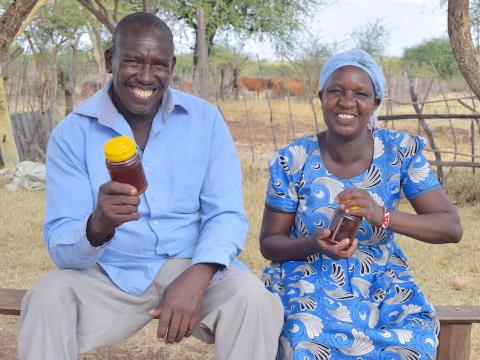
By Sarah Ooko, World Vision Senior Communications & Media Specialist, Kenya
Kipkemoi and his two sisters - Chematian and Jerop love playing together in the evenings, after returning home from school.
Their father,Titus, normally watches over them from a distance. Each time, it warms his heart to see the children happy and joyful.

Titus has a disability in the leg that limits his movements. He walks with a limp, using a cane for support and mobility.
As such, he is unable to run around with the children and actively participate in their playtime activities such as ball games or jump rope.
Nevertheless, he is content with just being present, surrounded by the happy laughter and cheers of the children as they play.
These moments are precious to him because only five years ago, he hardly had time to spend with his children.
Each day he would walk long distances to access grazing lands located on a hilly terrain, about seven kilometres away from his home.

During the long dry seasons, resulting from climate change, the distance covered would increase significantly.
The painstaking journey would drain Titus’ energy, making him bone tired by the time he got back home.
Worse still, his leg constantly ached due to the strain exerted on it. But Titus had to keep going, as livestock was the family's main source of livelihood.
"I was always in so much pain and agony. And I longed for a day when all this suffering would end," he says.
Titus prayers were answered when World Vision invited him to attend a training focusing on a low-cost tree growth and revival technique known as the Farmer Managed Natural Regeneration (FMNR) approach.
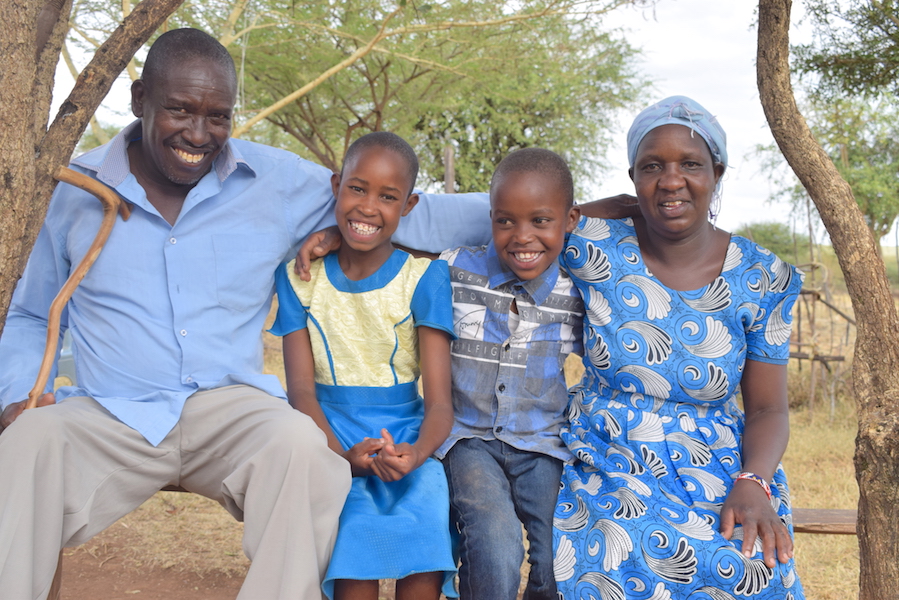
With the knowledge gained, Titus and his wife Damaris began promoting the robust growth of indigenous trees on their land through pruning and protecting the trees from damage by animals. They also enhanced the revival and regrowth of trees through existing tree stumps that they had previously cut.
"Before, we did not value trees as we didn't think they were important. But during the training, we learnt of the benefits that trees can give communities and so we were eager to revive the previously neglected trees on our land," says Titus.
Their efforts eventually paid off. And the family currently boasts of a mini-forest in their land, which has turned their lives around.

The trees were able to promote the growth of grass on their land, making it possible for the family to have sufficient pasture for their livestock, thereby boosting milk production for home consumption and income generation.
This has saved Titus from the torturous journey up the hill - in search of pasture - as well as the constant pain he always felt in his legs and back due to the strain on his muscles.
"Sometimes, my wife would help me but the distance and the hot sun would also make her suffer. Now we have more than enough grass for our livestock. We even have surplus grass to sell to our neighbours," he says.
Aside from the grass, the trees surrounding their home provided a conducive environment for the family to venture into beekeeping, which has given them an alternative source of income.
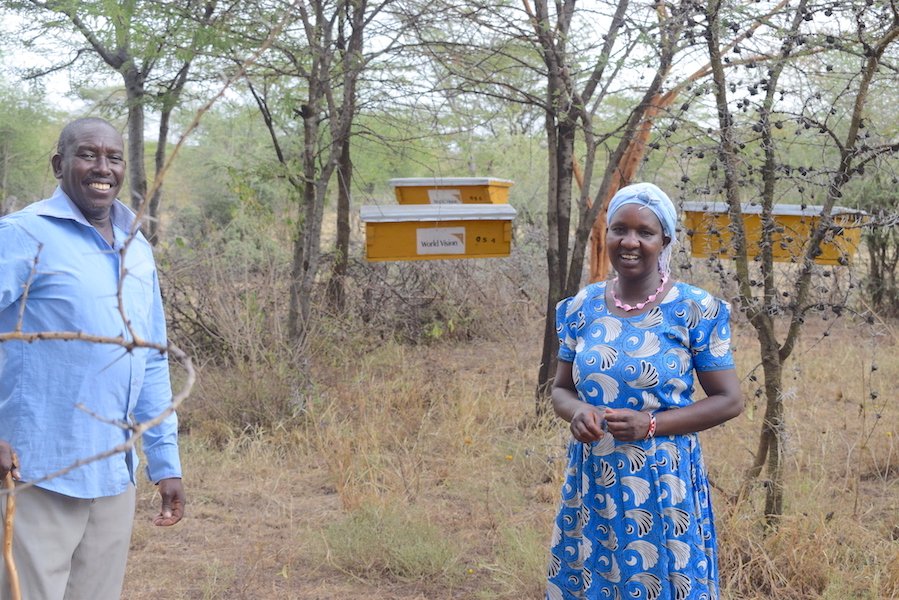
Trees and other flowering plants provide food and habitat for bees. This increases their productivity, thus enabling farmers to harvest sufficient quantities of honey. Through pollination, the bees also help trees and other plants to reproduce and thrive.
"All my life, I stuck to just livestock farming. I didn't know about these other things. So the training that World Vision gave me on FMNR and the benefits of trees was really helpful," he says.
Titus has invested in the beekeeping trade. He currently has four beehives that are placed strategically at the centre of his mini-forest.
"I even bought the right clothes and smoker that I use while harvesting honey," he says.
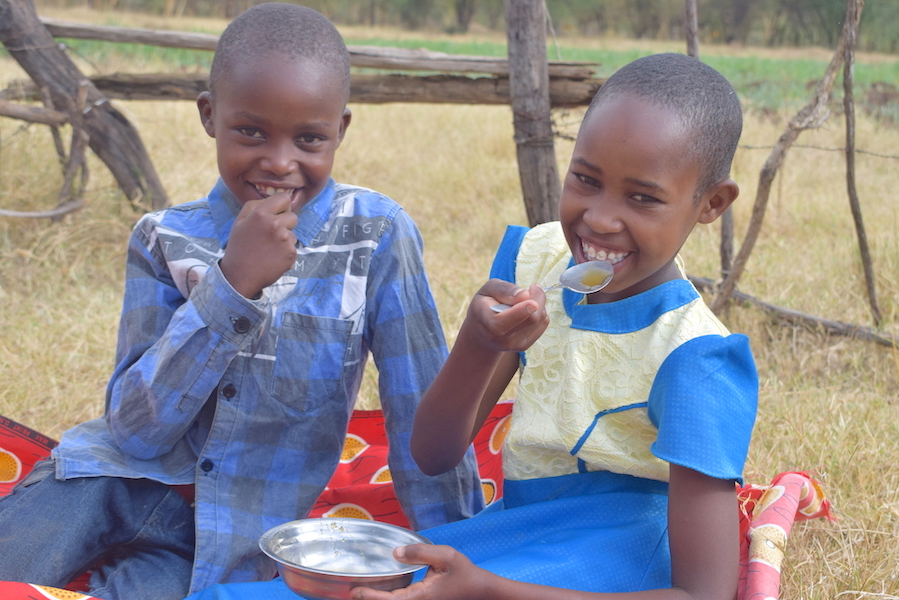
The honey is in high demand as many people are aware of its health benefits. For instance, it is an immune booster that helps keep diseases away. Honey also soothes sore throats and can help people; especially children alleviate coughs and manage flu symptoms effectively. Due to its antibacterial properties, it also assists the body to get rid of many bacteria that are responsible for most digestive stomach problems.
In this time of COVID-19, nutritionists and health experts in Kenya have recommended its use - in combination with lemons and ginger - to help prevent or manage symptoms of the coronavirus disease.
"The honey gives us good money and we cannot even meet the demand as many people want it. But before selling the honey, I ensure that I have reserved some for the family so we can all be healthy," says Titus.
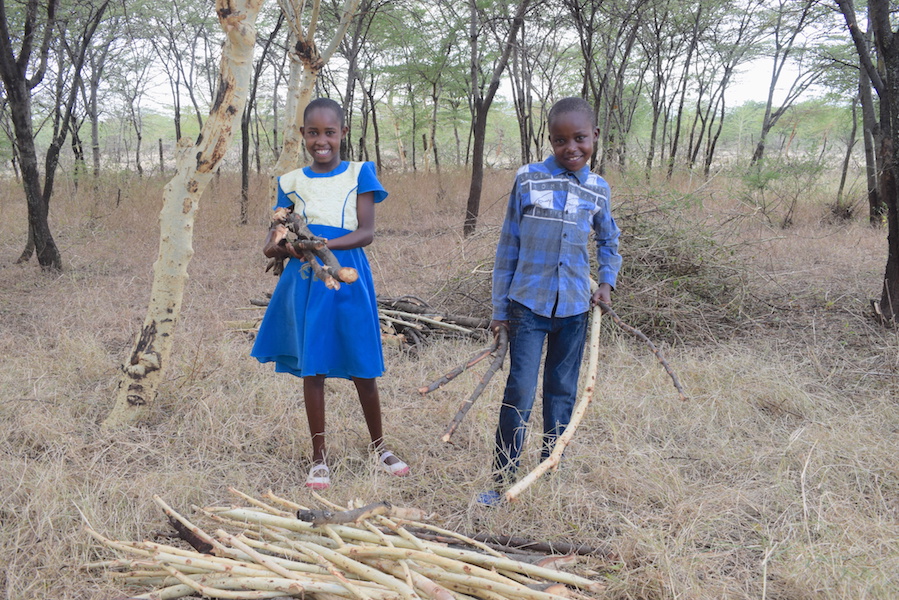
The thriving trees on the family's land has also saved Damaris and her children from the back breaking task of walking for long distances in search of firewood.
"We just get them from our mini-forest that is a stone throw away from the house. Life has really become easier for all of us," she says.
As livestock pastures and firewood are within the family's compound, Damaris now has some free time on her hands that has made it possible for her to venture into crop farming.

"I have grown sorghum and some vegetables so I don't have to keep buying them from the market. This will save us a lot money."
The benefits that Titus' family are enjoying due to the FMNR technique resonate with experiences of other community members.
A 2016 study published by World Vision found that the FMNR technique contributed to an increase in tree cover in areas where it was rolled out. The number of trees increased from a median of nine to 30 trees per acre respectively.
The findings of the study also showed that households, which had higher tree densities, made higher income from livestock products as well as tree and non-tree products such as charcoal, firewood, pasture and beekeeping.
This made families financially secure. For instance, before the introduction of FMNR, 69 percent of households indicated that they were forced to sell a portion of their staple food to meet daily expenditures. This figure dropped significantly to 25 percent due to increased household income.
*Featured photo at the top: Titus (left) and his wife Damaris with honey harvested from their beehives in Mogotio, Baringo County, Kenya. ©World Vision Photo/Sarah Ooko.